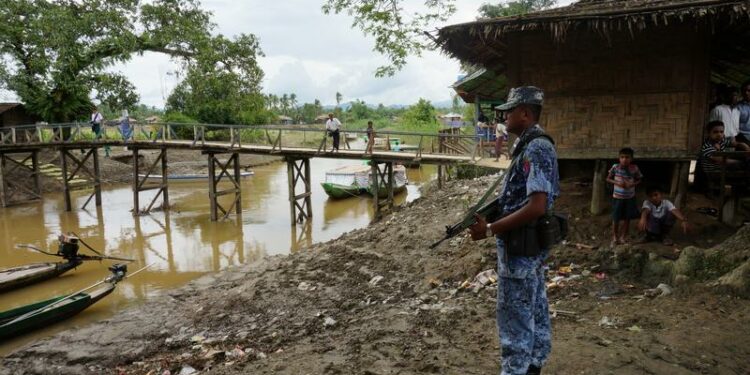NAYPYITAW — The Lower House voted down a proposal to intensify administrative and security methods in northern Rakhine State on Thursday.
The proposal was tabled by Arakan National Party (ANP) lawmaker Daw Khin Saw Wai of Rathedaung Township last Friday.
Twenty-eight lawmakers and military representatives debated her proposal before it was put to a vote. The outcome of the vote was 150 in favor, 232 against and 6 abstentions.
The ANP, opposition Union Solidarity and Development Party (USDP) and the military debated in favor of the proposal.
U Oo Hla Saw of the ANP argued that the Rakhine issue has gone beyond the problem of rule of law but developed into a national security and sovereignty issue.
“The warfare is complicated with political, religious and military issues, along with territorial expansion and false history,” he said, referring to a nationalist argument that the Rohingya have never been a recognized ethnic group in Myanmar.
Former Lt-Gen Thaung Aye of the USDP called for summoning a National Defense and Security Council (NDSC) meeting to discuss the issue. The NDSC is an 11-member council that holds the highest authority for national security issues in the country.
“Such an issue, which could potentially harm sovereignty, calls for a meeting of the NDSC that includes government, parliamentary speakers and military leaders to find a solution,” he said.
Lower House Speaker U Win Myint responded that it was the mandate of the president to summon a NDSC meeting and asked U Thaung Aye to withdraw his statement, saying that his call for such a meeting had nothing to do with the proposal in question.
U Thaung Aye then refused to withdraw his statement. But U Win Myint declared that he withdrew it with his authority as the parliamentary speaker.
The NLD-led government has not summoned a NDSC meeting since it took power, he told reporters after the session. According to U Thaung Aye, more than 200 NDSC meetings were summoned under the previous government, sometimes three meetings within a week.
“I would like to suggest that rather than putting human rights to the fore in response to pressures from the international community, [authorities] should focus on the sovereignty of the country, and the safety of local Arakanese people in handling the Rakhine issue,” argued military representative Maj Aung Kyaw Hnin.
He said the government should consult, cooperate with and seek advice from those who have experience in security sector regarding the Rakhine issue.
“According to reports that have yet to be confirmed, militants are plotting to rally villagers to attack security forces in case they come into the villages where they are based,” said military representative Lt-Col Zaw Tun Oo.
Military representative Col Tun Myat Shwe also questioned the discovery of supplies with the UN logo in hideouts on the Mayu Mountain Range.
“If Parliament only records the proposal through voting, it has to take responsibility for the consequences. Local ethnic people [of Rakhine] and all citizens will not be satisfied with the action of Parliament,” military representative Lt-Col Zaw Tun Oo told Parliament on Thursday.
Lower House Speaker U Win Myint asked him to withdraw his statement, saying that it overstepped the authority of lawmakers. And the military representative backtracked his argument.
Lawmakers from the NLD, however, defended that the government was trying its best to properly handle the issue.
Lawmaker Daw Ni Ni May Myint of the NLD pointed out that State Counselor Daw Aung San Suu Kyi chairs the Central Committee on the Implementation of Peace, Stability and Development of Rakhine State, while former UN Secretary-General Kofi Annan’s commission was assigned to provide input and Vice-President U Myint Swe’s commission to investigate on the ground.
“Looking at this, it is clear that the country’s leadership views the Rakhine issue as a problem of the entire country,” she said.
Lawmaker U Maung Myint of the USDP called for swiftly finishing the fencing of a remaining 40 miles on the Myanmar-Bangladesh border, and increasing security forces along the border.
“If the government allows us, we’ll finish the fencing within one year with our own funds,” he told Parliament.
He also called for the implementation of a citizenship verification process according to the 1982 Citizenship Law, and applying a population control law—one of the race and religion protection laws—in Rakhine State.
Daw Pyone Kathy Naing of the NLD said the government was undertaking short- and long-term plans to resolve the Rakhine issue, and that it was carrying out short-term plans to alleviate the problem and long-term plans to solve the root causes.
“Short-term plans include increasing security measures such as clearance operations, and the long-term plan focuses on stabilizing civil administration through political and social undertakings,” she said.
Despite the military representatives’ discussion, Deputy Minister for Home Affairs Lt-Gen Kyaw Swe, who came and answered the proposal, asked Parliament to record the proposal.
“As the Union government and Rakhine State government have formed necessary committees, and Tatmadaw, police, departments, community elders, civil society organizations, and locals are working in cooperation to ensure security, peace and stability, rule of law, and regional development, I’d say the proposal should be recorded,” he said.
Translated from Burmese by Thet Ko Ko.

















